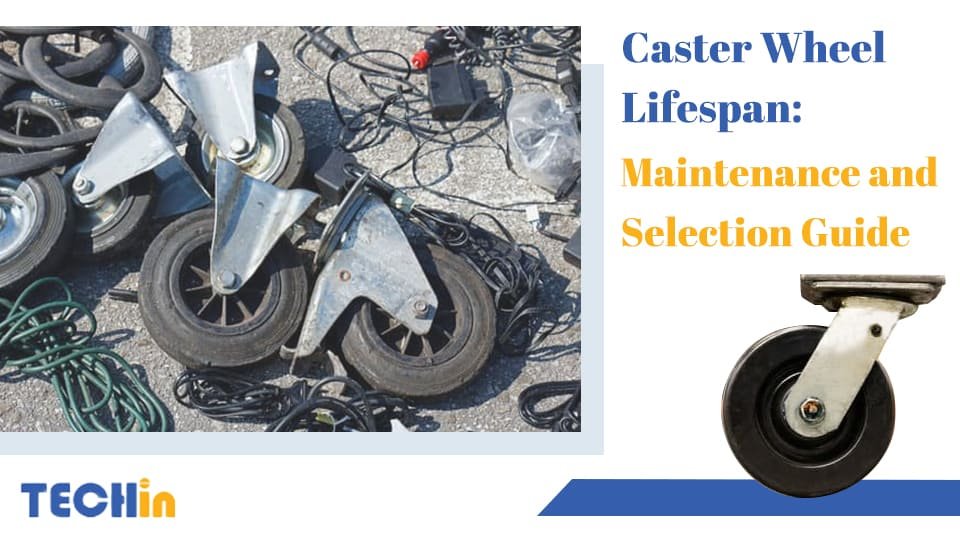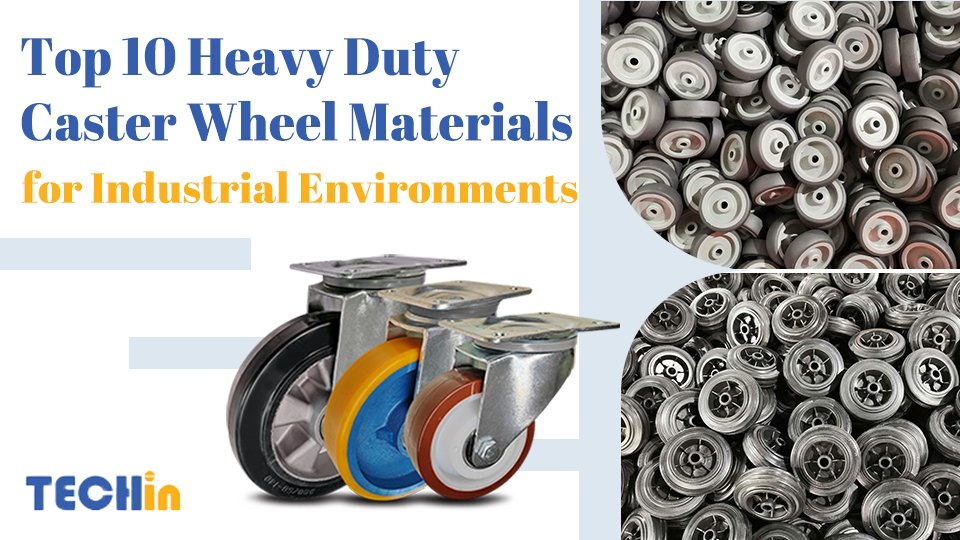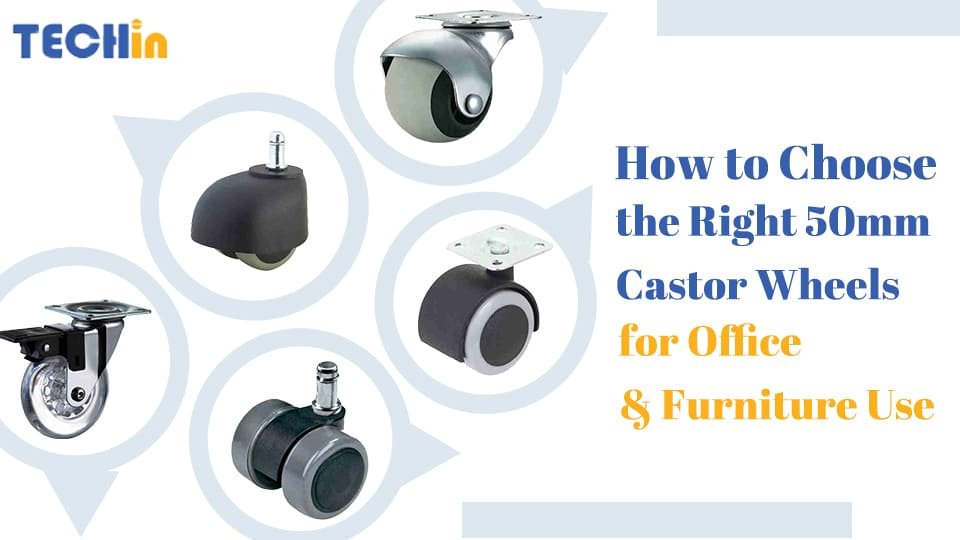Industrial casters are a must-have in many industries where moving heavy objects is a daily necessity. These wheels are designed to support heavy loads, ensuring smooth and efficient transportation of materials within manufacturing plants, warehouses, and other industrial settings.
Industrial caster wheels are primarily used in manufacturing plants, warehouses, and other industries that require moving large objects. These heavy duty casters make it easy to move material handling equipment, improving operational efficiency and safety.
Let’s explore the various aspects and benefits of industrial caster wheels.
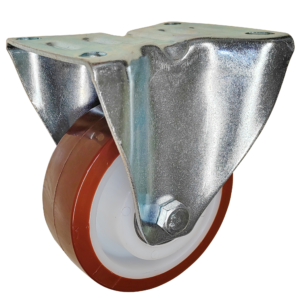
What are industrial caster wheels used for?
Industrial casters are used in environments where heavy items need to be moved. These wheels are critical for moving large machinery, heavy equipment, and large materials, especially in manufacturing and warehouse operations. For example, in the aerospace industry, caster wheels are used to move large assemblies and equipment during the manufacturing process.
Examples of Uses in Different Industries:
| Industry | Use Case |
|---|---|
| Aerospace | Moving large assemblies and equipment during production |
| Manufacturing | Transporting heavy machinery and materials |
| Warehousing | Facilitating the movement of large inventory and equipment |
| Healthcare | Ensuring mobility of hospital beds and medical equipment |
| Hospitality | Used in large kitchen and cleaning equipment for easy mobility |
What are the advantages of industrial caster wheels?
Industrial casters have a lot of advantages, including great traction and floor protection. They allow you to move smoothly and control your movement on different surfaces, which reduces the chances of scratching or damaging delicate floors. This makes them perfect for environments where both heavy loads and floor preservation are important. Additionally, rubber caster wheels provide good shock absorption, which protects the items being moved from damage.
Advantages of Industrial Caster Wheels:
| Advantage | Description |
|---|---|
| Traction | Ensures smooth and controlled movement on various surfaces. |
| Floor Protection | Reduces the risk of scratches or damage to delicate floors. |
| Load Bearing | Capable of supporting substantial loads, making them ideal for heavy-duty applications. |
| Shock Absorption | Rubber wheels provide good shock absorption, protecting transported items from damage. |

What is the difference between industrial caster wheels and regular caster wheels?
The primary difference lies in their load bearing capacity and intended use. Industrial casters are made to handle heavier loads and are typically used in manufacturing and warehouse settings. On the other hand, regular caster wheels are made for lighter applications, like office chairs and shopping carts. Industrial caster wheels are usually made from stronger materials, like steel or iron, so they can handle heavy-duty use.
Comparison of Industrial vs. Regular Caster Wheels:
| Feature | Industrial Caster Wheels | Regular Caster Wheels |
|---|---|---|
| Load Capacity | Designed for heavy loads | Designed for lighter loads |
| Material | Durable materials like steel, iron | Lighter materials like plastic, rubber |
| Application | Manufacturing, warehouses | Office chairs, shopping carts |
How do industrial caster wheels benefit warehouse operations?
In warehouse settings, industrial caster wheels enhance the functionality, stability, and maneuverability of objects. They are integral to material handling equipment, enabling efficient movement across various surfaces and contributing to streamlined operations. For example, you can put caster wheels on heavy-duty racks to move inventory around easily, which helps you use your space better and get more done. Plus, you can put caster wheels on pallet jacks and forklifts to move stuff around the warehouse floor without any problems.

Benefits in Warehouse Operations:
| Benefit | Description |
|---|---|
| Improved Maneuverability | Enhances the ability to move heavy items with ease. |
| Space Utilization | Allows for better organization and utilization of warehouse space by easily repositioning items. |
| Operational Efficiency | Contributes to faster and more efficient movement of goods and materials. |
| Safety | Reduces the risk of injuries by enabling smooth and controlled transport of heavy items. |
What materials are industrial caster wheels made from?
Industrial caster wheels are typically made from durable materials such as rubber, polyurethane (PU), polyamide (PA6), iron, and aluminum. These materials are chosen for their strength, capacity to bear heavy loads, and resistance to wear and tear, ensuring long-lasting performance in demanding environments. Rubber and PU wheels provide excellent traction and floor protection, while PA6 is known for its durability. Iron and aluminum wheels are ideal for high-load applications due to their strength.

Materials Used in Industrial Caster Wheels:
| Material | Description |
|---|---|
| Rubber | Provides good traction and floor protection, non-marking. |
| Polyurethane (PU) | Durable and provides excellent floor protection, suitable for various surfaces. |
| Polyamide (PA6) | Known for its strength and durability, ideal for heavy-duty applications. |
| Iron | Strong and durable, suitable for high-load applications. |
| Aluminum | Lightweight yet strong, resistant to corrosion, ideal for various industrial uses. |
What industries commonly use industrial caster wheels?
Several industries rely on industrial caster wheels, including manufacturing, aerospace, healthcare, and hospitality. These wheels are crucial in any setting where the mobility of heavy items is necessary for operational efficiency and safety. In healthcare, for example, caster wheels are used on hospital beds and medical equipment to facilitate patient care and equipment transport. In the hospitality industry, caster wheels are used in large kitchen equipment and cleaning carts to enhance mobility and efficiency.
Common Industries Using Industrial Caster Wheels:
| Industry | Example Applications |
|---|---|
| Manufacturing | Moving heavy machinery and materials |
| Aerospace | Transporting large assemblies and equipment |
| Healthcare | Ensuring mobility of hospital beds and medical equipment |
| Hospitality | Facilitating movement of large kitchen and cleaning equipment |
| Retail | Used in carts and shelving units for easy restocking and display adjustments |
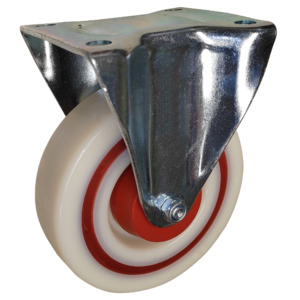
How do you choose the right industrial caster wheel?
Choosing the right industrial caster wheel involves considering factors such as load capacity, wheel material, and the specific environment in which they will be used. Ensuring that the wheel meets the demands of the application is vital for optimal performance. For example, in a corrosive environment, stainless steel caster wheels may be preferred for their resistance to rust and corrosion. Additionally, the type of floor surface and the frequency of use should be taken into account to select the most appropriate caster wheel.
Factors to Consider When Choosing Industrial Caster Wheels:
| Factor | Considerations |
|---|---|
| Load Capacity | Ensure the wheel can support the weight of the equipment or materials being moved. |
| Wheel Material | Choose a material suitable for the floor surface and environment (e.g., steel, rubber). |
| Environment | Consider factors like temperature, humidity, and exposure to chemicals. |
| Floor Surface | Select wheels that are compatible with the type of floor (e.g., smooth, rough, uneven). |
| Frequency of Use | Determine the durability needed based on how often the wheels will be used. |
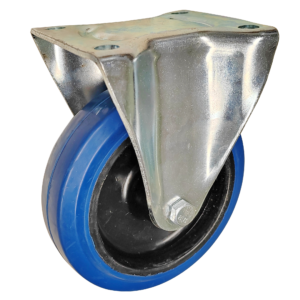
What maintenance is required for industrial caster wheels?
Regular maintenance is essential to keep industrial caster wheels in good working condition. This includes inspecting for wear and tear, lubricating moving parts, and ensuring proper alignment. Routine maintenance helps prolong the lifespan of the wheels and maintains their efficiency. It’s important to replace worn-out wheels promptly to avoid any operational disruptions. Proper storage and handling of caster wheels can also extend their service life.
Maintenance Tips for Industrial Caster Wheels:
| Maintenance Task | Description |
|---|---|
| Inspection | Regularly check for signs of wear and tear. |
| Lubrication | Lubricate moving parts to ensure smooth operation. |
| Alignment | Ensure wheels are properly aligned to avoid uneven wear. |
| Replacement | Promptly replace worn-out wheels to maintain efficiency. |
| Storage | Store caster wheels in a dry, cool place to prevent rust and deterioration. |
Summary
Industrial caster wheels are indispensable in various industries, providing essential mobility for heavy objects. Ensuring you choose the right wheels and maintain them properly can significantly enhance operational efficiency and safety. By understanding the different types, materials, and uses of industrial caster wheels, you can make informed decisions that will benefit your operations in the long run.




